Table of Contents[Hide][Show]
Serums are aqueous-based substances with activated ingredients meant to target different skin care concerns depending on the concentration of particular ingredients in the products. They also are known to be hydrators, as opposed to being moisturizers for your skin.
Typically, you would apply your serum to your skin after cleansing and before moisturizing. Serums are extremely lightweight, meaning they are easily absorbed into the skin and won’t leave your skin feeling greasy.
In this article, we will help you know how to make a face serum at home for various skin types. While “true” serums are aqueous-based hydrators, we’ll focus on oil-based “serums,” ideal for DIY enthusiasts. These homemade serums offer deep moisturization and an instant glow, using ingredients easily found at home. Get ready to create your personalized face serum tailored to your skin’s needs.
When creating a serum, it is essential to consider different skin conditions before choosing the right ingredients.
- Pick your carrier oil
- Pick an essential oil (or a few)
- Add vitamin E or vitamin C
- Add them together and put the mixture into a glass dropper bottle
You can also read on to learn how to best apply your serum in daily skin care rituals.
How To Choose the Right Carrier Oil for Each Skin Type
When choosing a carrier oil for your natural facial serum recipe, you can choose according to the skin type or personal preference.
When it comes to carrier oils, you may see some are specialty seed oils (like pomegranate seed and tamanu oil) while others are true carrier oils (like jojoba and grapeseed oil). True carrier oils are less concentrated than specialty seed oils and act as a “carrier” to deliver the other ingredients to your skin, hence the word “carrier”.
Most carrier oils tend to be neutral in scent and color. Carrier oils are great at diluting essential oils and carrying them into the skin because essential oils alone can potentially irritate the skin, especially those with sensitivities. When choosing carrier oils, choose organic and cold-pressed oils. They should be free of additives and preservatives.
Carrier Oils for Oily Skin
When selecting carrier oils for oily skin, it’s crucial to choose lightweight options. Ingredients like grapeseed, black cumin seed, and hazelnut oils get absorbed rapidly
- Grapeseed oil is rich in vitamin E and linoleic acid, and it can be nutritive to the skin, lessening the appearance of wrinkles. It is lightweight and easily absorbed into the skin, and it also has a neutral scent.
- Black cumin seed oil is rich in essential fatty acids, vitamins, and minerals, supporting the skin’s overall health and helping to maintain a clear and balanced complexion.
Hazelnut oil is helps to tighten the look of pores, is light and easily absorbable, and ensures that it moisturizes the skin without leaving a heavy or greasy residue.
Carrier Oils for Dry Skin
Dry, flaky skin needs dense, emollient carrier oils that provide lasting moisturization. We suggest these carrier oils for their highly moisturizing, antioxidant properties that counteract dryness while improving the look of elasticity and tone.
- Jojoba oil is slightly heavier but closely mimics the skin’s natural oils, making it great for drier skin types. It is easily absorbed into the skin without clogging pores.
- Rosehip seed oil is high in vitamin A and C. While vitamin A creates even, glowing skin, both vitamins help create a protective base for the skin against environmental stressors. Unlike other true carrier oils, rosehip oil can only be used as a base oil.
- Sweet almond oil is lightweight, absorbs easily, moisturizes dry skin and offers natural skin protection.
- Avocado oil is high in oleic acid, which can help moisturize the skin.
- Sweet almond oil absorbs easily since it’s lightweight and is a good moisturizer.
Carrier Oils for Aging Skin
When formulating a serum for mature skin, using these rejuvenating oils revitalize the complexion for a more youthful radiance.
- Rosehip seed oil contains natural retinoids that can help rejuvenate the skin’s appearance. It’s also a good moisturizer.
- Jojoba oil is very moisturizing and has rejuvenating properties to reduce the appearance of fine lines.
- Olive oil is very moisturizing and protects the skin against environmental stressors. If your skin is oily, this wouldn’t be the best carrier oil to choose, as it is heavier.
- Avocado oil contains vitamins A, D and E, which promote fresh and revitalized skin and visibly improve the look of beautiful skin.
- Argan oil improves skin hydration.
Carrier Oils for Normal or Combination Skin
For normal or combination skin, it’s best to take a balanced approach with lightweight yet nourishing carrier oils.
- Jojoba oil works with all skin types.
- Rosehip oil is a great moisturizer.
- Coconut oil is highly moisturizing and protects the skin against environmental stressors. However, we recommend using a high-quality fractionated coconut oil, as it absorbs better and doesn’t clog pores.
- Grapeseed oil is excellent for all skin types.
Carrier Oils for Sensitive Skin
For crafting serums for sensitive skin, we specifically recommend these gentle, soothing carriers for their exceptionally delicate properties.
- Rosehip oil helps unclog pores, leaving the skin looking luminous.
- Oat oil soothes the skin and opens up pores.
- Sweet almond oil moisturizes, soothes and protects skin against environmental stressors.
How To Choose an Essential Oil for Different Skin Types
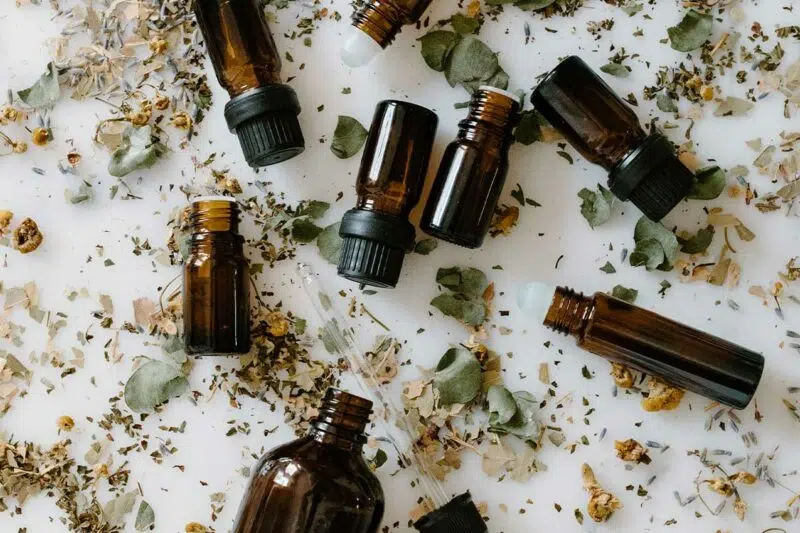
Essential Oils for Dry Skin
When selecting essential oils for dry, flaky skin, the goal is finding hydrating ingredients that soak in quickly.
- Lavender is naturally hydrating and can moisturize the skin without clogging pores or appearing too greasy.
- Chamomile contains azulene which increases moisture and reduces the appearance of temporary redness. Avoid it if you have ragweed allergies.
- Sandalwood promotes hydration and reduces the appearance of redness on the skin.
Essential Oils for Oily Skin
Clarifying ingredients like clary sage and rosemary contain natural purifying properties that control shine and clear pores without causing dryness or flakiness and without completely stripping the skin.
- Clary sage has active compounds, which make it a great option for balancing the skin’s natural oils.
- Rosemary contains esters that keep excess sebum production at bay. It increases skin hydration.
- Frankincense can balance natural oils on the skin.
- Geranium balances out skin oils.
- Neroli contains citral, which may help balance the skin’s natural oils without completely drying out the skin.
Essential Oils for Sensitive Skin
When choosing essential oils, these are great options for incorporating into a DIY face serum for sensitive skin.
- Lavender
- Frankincense
- Sandalwood
Essential Oils for Anti-aging
We suggest these anti-aging essentials specifically for their synergistic abilities to restore firmness and minimize the look of wrinkles when crafting DIY serums.
- Rose contains vitamins A and C, which renews the look of beautiful skin.
- Myrrh is rich in antioxidants that give your face a glowing look, resulting in more refined-looking skin.
- Jojoba can rejuvenate the skin’s top layer and visibly plumps up the look of the skin for a youthful glow
- Clary sage reduces the appearance of wrinkles and fine lines on the skin.
- Frankincense: Has anti-aging properties for mature skin.
How To Make Face Serum at Home?
Here are three main steps with ingredient ratios for each skin type you need to follow for creating your own facial oil serum at home
- Add 2 ounces of carrier oil into a glass bottle.
- Add 20 drops of essential oil(s).
- Put the lid back on and gently shake the bottle to mix the carrier oil and essential oils.
DIY Face Serum for Dry Skin
- 2 ½ teaspoons of jojoba oil
- One teaspoon of rosehip seed oil
- Five drops of lavender essential oil
- Five drops of frankincense essential oil
Carefully pour all the ingredients into your serum bottle. You can use a funnel. Then cover it and gently shake to mix.
DIY Face Serum for Oily Skin
- Two tablespoons of jojoba oil
- Seven drops of lavender essential oil
- Seven drops of neroli essential oil
DIY Face Serum for Anti-aging
- Three tablespoons of jojoba oil
- One tablespoon of rosehip seed oil
- Five drops of rose essential oil
- Five drops of frankincense essential oil
- Five drops of jojoba essential oil
- Five drops of myrrh essential oil
Using a funnel, delicately pour the ingredients into the serum bottle, then secure the lid and softly shake it to blend everything together.
Homemade Face Serum for Combination Skin
- 2 teaspoons grapeseed oil
- 1 teaspoon argan oil
- 4 drops chamomile essential oil
- 4 drops geranium essential oil
Combine all ingredients in a serum bottle, using a funnel if necessary. Secure the lid and gently shake to blend the oils together.
Homemade Serum for Sensitive Skin
- 2 teaspoons sweet almond oil
- 1 teaspoon apricot kernel oil
- 4 drops chamomile essential oil
- 4 drops lavender essential oil
Pour all ingredients into a serum bottle, preferably with a funnel. Seal the bottle and shake gently to ensure thorough mixing.
Conclusion
Creating a homemade serum for face care, especially a DIY facial oil serum, offers numerous benefits for skin nourishment and moisturization.
The above guide will help you know which oils are best for your skin type and which ones you should stay away from. Once you have made your first oil-based serum, it becomes easy to make more in the future and better understand which serum ingredients work best for your skin. Even when you don’t feel like making your homemade serums, knowing what works for you will help you buy a great serum that won’t cause any problems on your skin.
Don’t stop there, learn more about vitamin C serum vs powder to choose the right product for your skin.


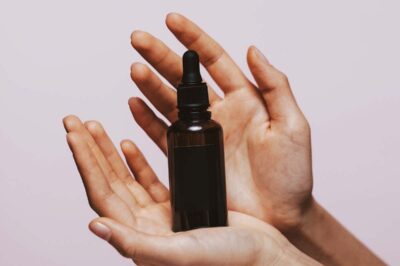


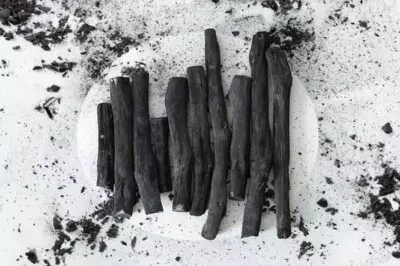
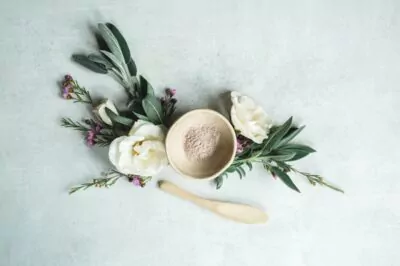
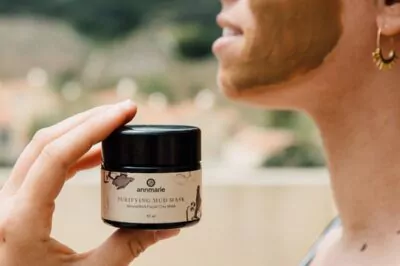
Leave a Reply